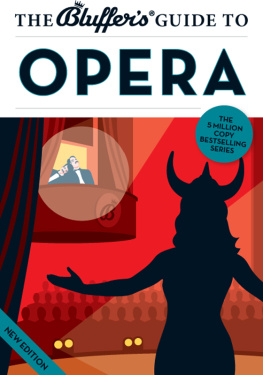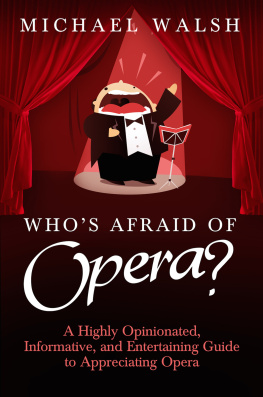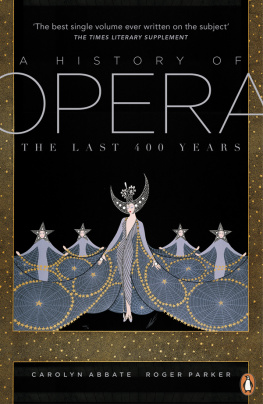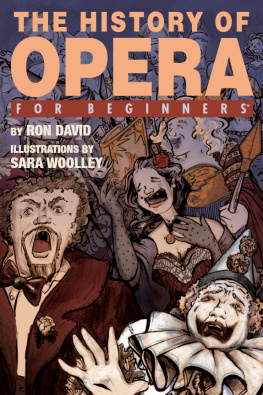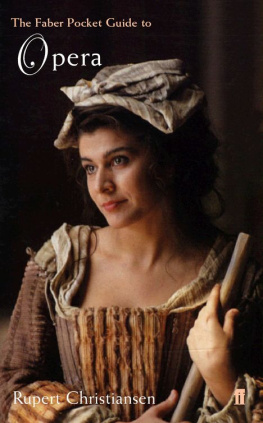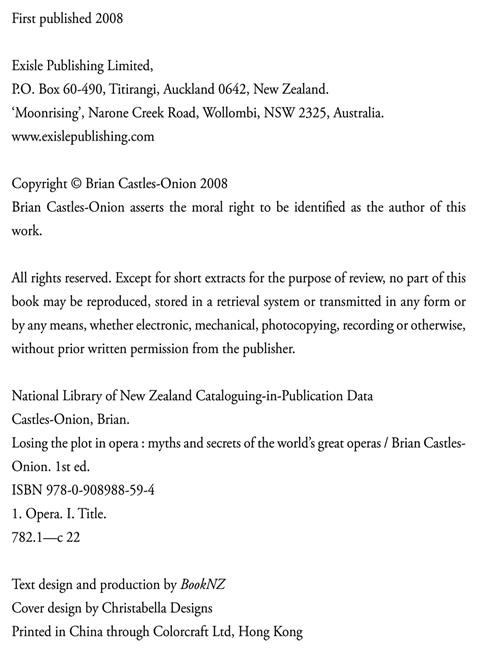Special thanks to Ian Watt for patiently extracting every word and editing out the rudest bits, and to Benny Thomas for having faith that this book could eventuate in the first place.
To Geraldine Turner for correcting my grammar, putting up with my tantrums when I had writers block and steadily reminding me that I had another few pages to write...
To the great Australian baritone, Robert Allman, who supplied a wealth of information (most of which could not go to print!).
To Dame Joan Sutherland and Richard Bonynge and to all my colleagues, past and present, who have not always patiently endured hearing these anecdotes in coffee breaks.
And to the brilliant lyricist Alan Jay Lerner, who once said, I have always believed that only genuinely talented people can create something that is genuinely bad. Only the mediocre are always at their best.
Glossary
Aficionado: Someone to avoid at all times when talking opera.
Aria: A solo moment for the singer, a song.
Bel canto: This translates from the Italian as beautiful singing but is a commonly misused term. Correctly, it refers to a musical and vocal style when drama and perfect singing technique were considered at its peak. These days bel canto means anything from singing fast and high to low and slow. The most eloquent usage comes from the divine Madame Vera Galupe-Borszkh, internationally renowned traumatic soprano, who declares that the vocal life of a soprano has four stages: 1. Bel canto, 2. Can belto, 3. Cant belto, 4. Cant canto.
Cabaletta: The bit following an aria where the singer suddenly changes his/her mind and sings a more rhythmic tune over a rumpty-tum orchestral accompaniment. If there is a repeat of this cabaletta the singer is advised to embellish the tune with extra notes which appear to the listener to be improvised but in reality it is well rehearsed. Our heroine, Maria Callas, commented that the first cabaletta was for the composer, the second was for Callas.
Cadence: An harmonic comma or full stop.
Coda: Thats all, folks!
Coloratura: The fast runny bits that sometimes thrill an audience.
Comprimario: A performer who specialises in character roles. Although frequently not possessing the most beautiful voice on the stage, this is the person who sometimes supplies the laughs and the irritations.
Continuo: A harpsichord, fortepiano or any museum-type keyboard instrument that plays with the singer during recitatives to keep them in pitch. Continuo players are encouraged to be inventive and embellish their music to enhance the onstage action.
Heldentenor: A dramatic tenor who specialises in the German repertoire. Some opera authorities believe that they are related to the dodo long extinct.
Interval: A 20-minute pause between acts where you can catch up with friends in the foyer for a drink and chat about anything not related to the performance in hand, or indeed the time to leave a bad performance. Lifes too short.
Maestro: God.
Manuscript: The original scribblings of the composer the holy paper chalice.
Metronome: A mechanical device that produces a regulated beat, measured in beats-per-minute, which enables a performer to play the exact speed thats marked on the sheet music. Its the thing I hated most when I started out learning the piano. It would suddenly go faster or slower than I was playing!
Motif/Leitmotif (tr. leading motif or recurring musical fragment): The little snippet of a recurring tune which composers, especially Richard Wagner, used to remind you of a specific character or dramatic moment in the opera.
Obbligato: An instrumental solo that occurs at the same time as someone is singing. Its like a duet with your favourite instrument.
Podium: The sacred spot in the orchestra pit where the conductor stands. Great performances, not necessarily musical, are regularly seen on this small rise.
Proscenium arch: The archway between the audience and the stage. Its the sometimes elaborate frame that borders the curtain. If youre a performer onstage and not behind the proscenium arch when the curtain comes down, youre going to be very embarrassed.
Recitative: The talky bits between the arias and ensembles. Sometimes theres a tinny harpsichord playing at the same time.
Repertoire: Scheduled operas in an opera companys season or the roles an artist would like to sing.
Repetiteur: A musician (often reluctant to be in the public eye) who resembles Rossinis Figaro a master of all trades. Simply translated, a repetiteur repeats until its learnt! Not only does he (or she) teach the singers their roles and oversee standards of musicianship and diction, but they also play piano at staging rehearsals, work backstage during performances and assist the conductor. They are also scapegoats for any problems between maestro and artist!
Squillo: The core or edge of the voice that can cut through an orchestra like a sabre.
Stretta: The bit at the end of a musical section that speeds up to boiling point.
Tessitura: The vocal range where the role or aria sits. With most singers, its always too high.
Testosterone: The manly juice that makes a singer sexy.
Verismo: True to life opera plots that have fairly passionate vocal outbursts with lots of yelling, crying and death.
Vibrato: An expressive and technically modulated vocal tool created by the flow of air as it passes the vocal folds. Used in excess, it can wobble out of control thus making it hard to distinguish what pitch is intended. In the hands of a sensitive vocal artist, it can resemble the artistry of a fine instrumentalist.
Ensembles
Duet: When one singer is joined by a second singer.
Trio: The stage is getting a little crowded.
Quartet: Far too many egos on stage for one man to handle.
Quintet: Not interested.
Sextet: Lets have fun.
Dynamics
Pianissimo: Very soft a dynamic never used or understood by an opera singer.
Piano: Soft or a little softer than you sang the last phrase.
Mezzo piano: Half soft (are you kidding?).
Mezzo forte: Half loud (give me a break!).
Forte: A general volume for a singer.
Fortissimo: Very loud (just in case my fans in the back row cant hear me).


